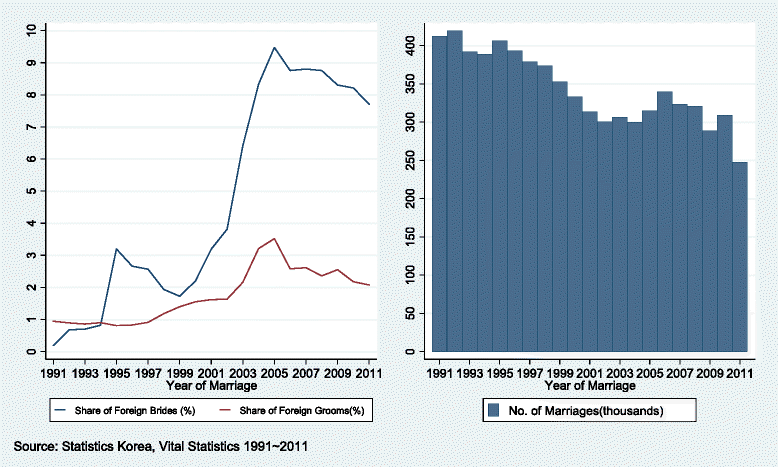Don't ask for fair treatment? A gender analysis of ethnic discrimination, response to discrimination, and self-rated health among marriage migrants in South Korea
- PMID: 27430432
- PMCID: PMC4949882
- DOI: 10.1186/s12939-016-0396-7
Don't ask for fair treatment? A gender analysis of ethnic discrimination, response to discrimination, and self-rated health among marriage migrants in South Korea
Abstract
Background: Ethnic discrimination is increasingly common nowadays in South Korea with the influx of migrants. Despite the growing body of evidences suggests that ethnic discrimination negatively impacts health, only few researches have been conducted on the association between ethnic discrimination and health outcomes among marriage migrants in Korea. This study sought to examine how ethnic discrimination and response to the discrimination are related to self-rated health and whether the association differs by victim's gender.
Methods: We conducted two-step analysis using cross-sectional dataset from the 'National Survey of Multicultural Families 2012'. First, we examined the association between perceived ethnic discrimination and self-rated health among 14,406 marriage migrants in Korea. Second, among the marriage migrants who experienced ethnic discrimination (n=5,880), we examined how response to discrimination (i.e., whether or not asking for fair treatment) is related to poor self-rated health. All analyses were conducted after being stratified by the migrant's gender.
Results: This research found the significant association between ethnic discrimination and poor self-rated health among female marriage migrants (OR: 1.53, 95 % CI: 1.32, 1.76), but not among male marriage migrants (OR: 1.16, 95 % CI: 0.81, 1.66). In the restricted analysis with marriage migrants who experienced ethnic discrimination, compared to the group who did not ask for fair treatment, female marriage migrants who asked for fair treatment were more likely to report poor self-rated health (OR: 1.21, 95 % CI: 0.98, 1.50); however, male marriage migrants who asked for fair treatment were less likely to report poor self-rated health (OR: 0.65, 95 % CI: 0.36, 1.04) although both were not statistically significant.
Conclusions: This is the first study to investigate gender difference in the association between response to ethnic discrimination and self-rated health in South Korea. We discussed that gender may play an important role in the association between response to discrimination and self-rated health among marriage migrants in Korea. In order to prevent discrimination which could endanger the health of ethnic minorities including marriage migrants, relevant policies are needed.
Keywords: Ethnic discrimination; Gender difference; Marriage migrant; Response to discrimination; South Korea.
Figures
Similar articles
-
Ethnic discrimination, asking for fair treatment, and poor self-rated health: a gender stratified analysis of 13,443 Korean Chinese waged workers in South Korea.Int J Equity Health. 2024 Apr 25;23(1):82. doi: 10.1186/s12939-024-02160-0. Int J Equity Health. 2024. PMID: 38664773 Free PMC article.
-
Migration processes and self-rated health among marriage migrants in South Korea.Ethn Health. 2016;21(1):20-38. doi: 10.1080/13557858.2014.992299. Epub 2015 Jan 3. Ethn Health. 2016. PMID: 25559309 Free PMC article.
-
Discrimination-related health inequality and role of social capital among marriage migrant women in South Korea.Int J Equity Health. 2016 Oct 26;15(1):176. doi: 10.1186/s12939-016-0464-z. Int J Equity Health. 2016. PMID: 27782843 Free PMC article.
-
Racism and health in South Korea: history, concept, and systematic review.Lancet Reg Health West Pac. 2024 Nov 7;52:101228. doi: 10.1016/j.lanwpc.2024.101228. eCollection 2024 Nov. Lancet Reg Health West Pac. 2024. PMID: 39582600 Free PMC article. Review.
-
Social integration and heath policy issues for international marriage migrant women in South Korea.Public Health Nurs. 2010 Nov-Dec;27(6):561-70. doi: 10.1111/j.1525-1446.2010.00883.x. Epub 2010 Sep 22. Public Health Nurs. 2010. PMID: 21087310 Review.
Cited by
-
Lookism hurts: appearance discrimination and self-rated health in South Korea.Int J Equity Health. 2017 Nov 25;16(1):204. doi: 10.1186/s12939-017-0678-8. Int J Equity Health. 2017. PMID: 29178889 Free PMC article.
-
Comprehensive Comparisons of Family Health Between Families With One Immigrant Parent and Native Families in Taiwan: Nationwide Population-Based Cohort Study.JMIR Public Health Surveill. 2022 Dec 19;8(12):e33624. doi: 10.2196/33624. JMIR Public Health Surveill. 2022. PMID: 36534459 Free PMC article.
-
A Scoping Review of the Health of East and Southeast Asian Female Marriage Migrants.J Immigr Minor Health. 2020 Feb;22(1):182-211. doi: 10.1007/s10903-019-00901-w. J Immigr Minor Health. 2020. PMID: 31152303
-
Ethnic discrimination, asking for fair treatment, and poor self-rated health: a gender stratified analysis of 13,443 Korean Chinese waged workers in South Korea.Int J Equity Health. 2024 Apr 25;23(1):82. doi: 10.1186/s12939-024-02160-0. Int J Equity Health. 2024. PMID: 38664773 Free PMC article.
-
Factors associated with self-rated health among immigrant workers in South Korea: Analyzing the results of the 2020 survey on immigrants' living conditions and labor force.Front Public Health. 2022 Sep 23;10:933724. doi: 10.3389/fpubh.2022.933724. eCollection 2022. Front Public Health. 2022. PMID: 36211667 Free PMC article.
References
-
- Kim H-R, Oh I. Foreigners cometh! Paths to multiculturalism in Japan, Korea and Taiwan. Asian Pac Migr J. 2012;21:105–133. doi: 10.1177/011719681202100105. - DOI
-
- Kang DK, O J-E, Lee CW, Choi S, Choi Y: Migration Trend of Korea, 2014. In IOM MRTC Collection of Migration Policy Research Republic of Korea IOM Migration Research and Training Centre; 2014. [in Korean].
-
- Jeon K, Chung H, Kim Y, Kim Y, Joo J, Kim H, Tong C: A study on the national survey of multicultural families 2012. Policy report (2012–59) Seoul, Korea: Ministry of Gender Equality and Family 2013. [in Korean].
-
- Kim H-K. Marriage Migration Between South Korea and Vietnam: A Gender Perspective. Asian Perspec. 2012;36:531–563.
-
- Kawaguchi D, Lee S. Brides for sale: Cross-border marriages and female immigration. Harvard Business School Research Paper Series. 2012;12–082.
MeSH terms
LinkOut - more resources
Full Text Sources
Other Literature Sources


